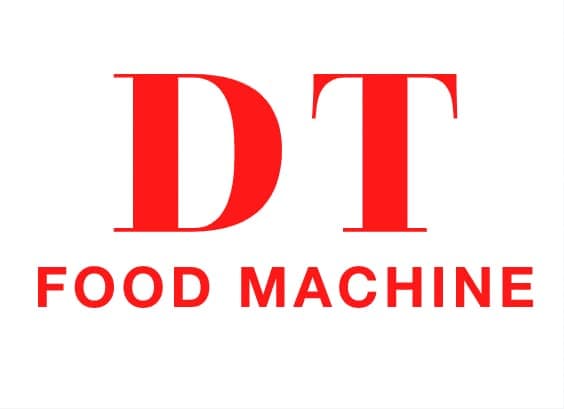Tomato powder is one of the most convenient and valuable food ingredients in modern food processing. It is widely used in instant soups, sauces, snacks, seasonings, ready-to-eat meals, and even health products due to its high nutritional value, long shelf life, and easy storage. To meet the growing demand for tomato powder in the global market, food processors require an efficient and reliable Tomato powder making machine that can handle continuous production while maintaining product quality.
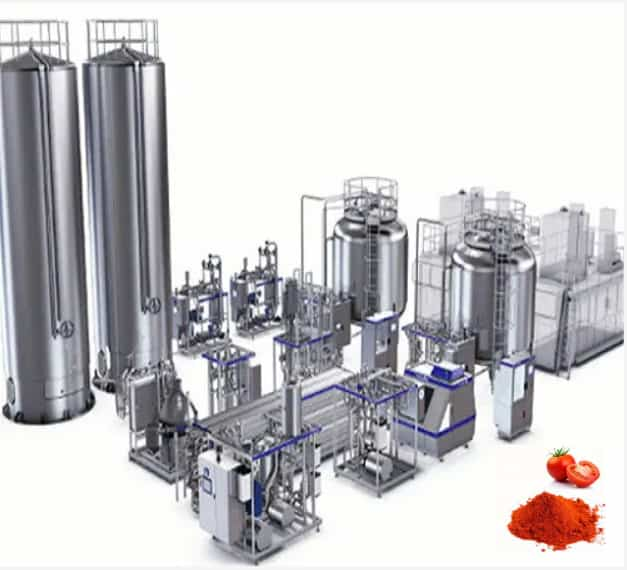
We introduces the Tomato powder making machine with 500kg per hour capacity, explains its technical features, production process, advantages, and key applications. Whether you are a small entrepreneur or a large food processing factory, understanding how this machine works will help you make the right investment decision.

1. Introduction to Tomato Powder Making Machine
A Tomato powder making machine is a specialized food processing equipment designed to transform fresh tomatoes into fine tomato powder. The process involves several key stages: washing, crushing, pulping, concentrating, spray drying, and packaging. Compared with traditional sun-drying or manual methods, a modern machine ensures:
- High efficiency
- Consistent product quality
- Hygienic food processing
- Higher yield with reduced waste
The tomato powder produced can retain natural color, flavor, aroma, and nutritional value, which is highly demanded in the food industry.
2. Production Capacity: 500kg per Hour
The machine discussed in this article has a 500kg/hour processing capacity, which makes it suitable for medium to large-scale tomato powder production. Depending on the customer’s needs, the production capacity can be customized from 100kg/hour up to 2 tons/hour.
A typical machine with 500kg/hour capacity can produce around 3–4 tons of tomato powder per day, assuming continuous operation. This level of production is ideal for export-oriented factories or domestic food manufacturers supplying supermarkets, restaurants, and food processing companies.
3. Technical Process of Tomato Powder Making Machine
The process of turning fresh tomatoes into fine powder is highly technical. Below is a step-by-step explanation of how a Tomato powder making machine works:
Step 1: Tomato Washing and Sorting
- Fresh tomatoes are fed into a bubble washing machine.
- Dirt, pesticides, and foreign particles are removed.
- A sorting conveyor ensures only ripe and healthy tomatoes are processed.
Step 2: Crushing and Pulping
- The washed tomatoes are transferred to a crusher.
- A pulping machine separates tomato pulp from seeds and skin.
- This ensures smooth consistency and higher powder quality.
Step 3: Preheating and Enzyme Deactivation
- Tomatoes undergo preheating to deactivate enzymes.
- This step prevents oxidation and helps preserve natural color and flavor.
Step 4: Concentration
- A vacuum concentrator reduces the water content of tomato pulp.
- This increases the solid content, which is crucial for efficient drying.
Step 5: Spray Drying
- The concentrated pulp is fed into a spray dryer.
- Hot air quickly evaporates moisture, leaving behind fine tomato powder.
- Spray drying ensures uniform particle size and prevents clumping.
Step 6: Powder Collection and Sieving
- A cyclone separator collects the fine tomato powder.
- Sieving equipment ensures the powder is uniform and smooth.
Step 7: Packaging
- The finished tomato powder is packed using an automatic packing machine.
- Options include sachets, pouches, jars, or bulk bags depending on client requirements.
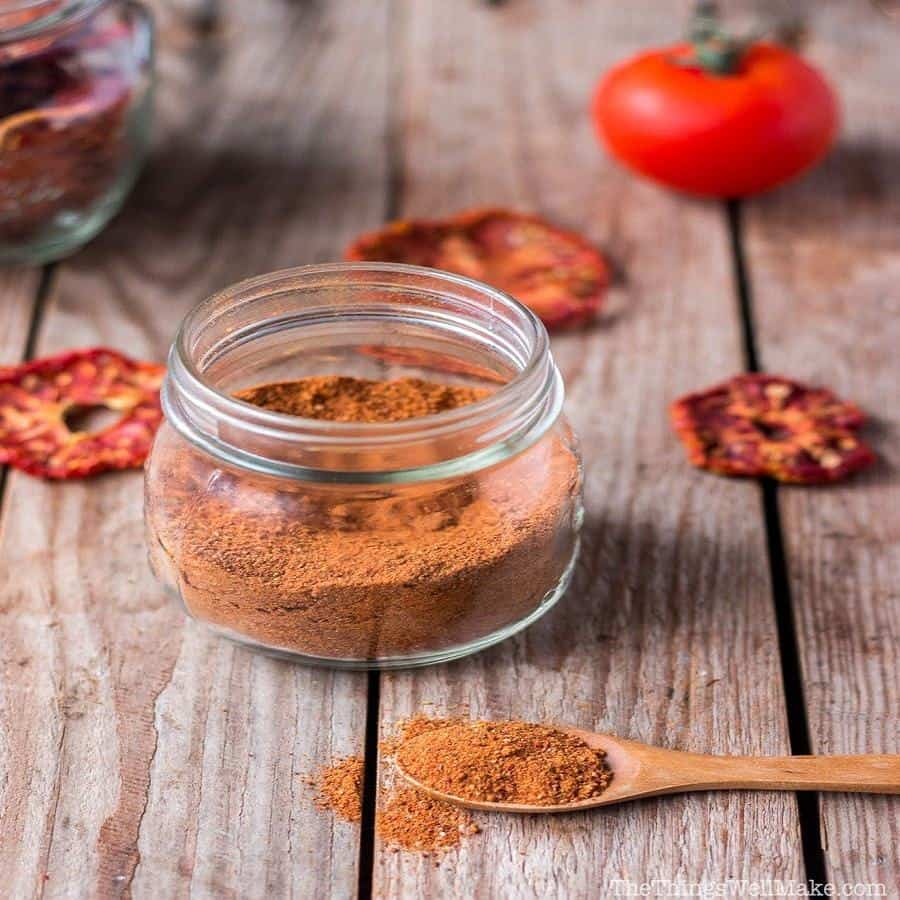
4. Technical Features of Tomato Powder Making Machine
The Tomato powder making machine has several advanced technical features that make it highly efficient and reliable.
4.1 High Efficiency and Large Output
- Capacity ranges from 100kg/hour to 2000kg/hour.
- Continuous operation with automatic feeding and discharge.
4.2 Advanced Spray Drying Technology
- Spray dryer ensures even drying with hot air circulation.
- Moisture content of final product is less than 5%.
- Retains the natural color and flavor of tomatoes.
4.3 Energy Saving Design
- Vacuum concentration reduces energy use.
- Insulated pipelines minimize heat loss.
4.4 Hygienic and Food-Grade Construction
- Machine is made from 304/316 stainless steel.
- Easy to clean, anti-corrosion, and meets international food safety standards.
4.5 Automation and Control System
- PLC control with touch screen interface.
- Operators can adjust temperature, drying speed, and airflow easily.
4.6 Versatility
- Can process not only tomatoes but also mango, banana, carrot, garlic, onion, ginger, and other fruits/vegetables for powder production.
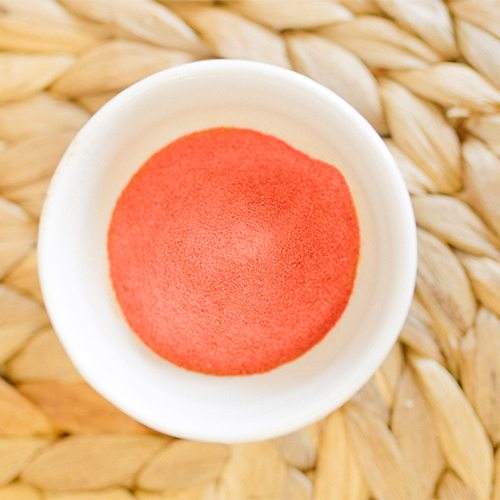
5. Technical Specifications Table (500kg/hour Model)
| Parameter | Specification |
|---|---|
| Capacity | 500 kg/hour (customizable) |
| Raw Material Input | Fresh tomatoes |
| Final Product | Tomato powder (<5% moisture) |
| Drying Method | Spray drying system |
| Material | Stainless steel 304/316 |
| Control System | PLC + Touch Screen |
| Power Requirement | 50–75 kW (depending on design) |
| Operating Temperature | 150–200°C (adjustable) |
| Powder Collection | Cyclone separator + bag filter |
| Packaging Options | Sachet, pouch, jar, or bulk bag |
| Daily Production (24h) | 3–4 tons of tomato powder |
6. Advantages of Using a Tomato Powder Making Machine
- Consistent Quality – Every batch of tomato powder is uniform in taste, texture, and color.
- Extended Shelf Life – Tomato powder lasts much longer than tomato paste or puree.
- Space Saving – Powder takes up less space during storage and transport.
- Hygienic and Safe – The entire process is enclosed, preventing contamination.
- Cost-Effective – Reduces wastage and labor costs compared with manual drying methods.
- Scalability – Can easily be expanded for higher capacities.
7. Applications of Tomato Powder
Tomato powder has broad applications in both the food and beverage industries:
- Instant soups and sauces
- Ketchup powder and flavor enhancers
- Seasonings and spice blends
- Ready-to-eat meals
- Snack seasoning (chips, crackers, noodles)
- Baby food formulations
- Bakery products (bread, biscuits)
- Nutritional supplements
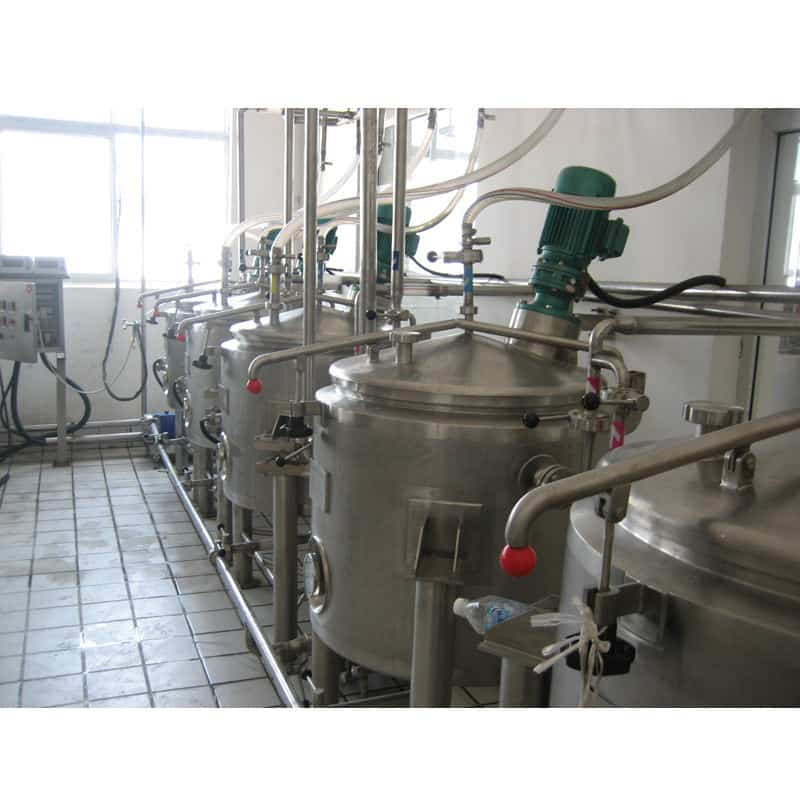
8. Quality Control in Tomato Powder Production
To ensure high-quality tomato powder, several parameters are carefully monitored:
- Moisture Content: Kept below 5% to prevent microbial growth.
- Particle Size: Uniform size ensures smooth mixing in food applications.
- Color Preservation: Natural red color is maintained by enzyme deactivation and controlled drying.
- Nutrient Retention: Vitamins, lycopene, and antioxidants are preserved during processing.
9. Tomato Powder Machine Variants by Capacity
Manufacturers usually provide different models of Tomato powder making machine:
- Small-Scale Units (100–200 kg/hour): Ideal for startups and pilot production.
- Medium-Scale Units (300–800 kg/hour): Suitable for established processors.
- Large-Scale Units (1000–2000 kg/hour): Designed for industrial production and exports.
10. Installation and Maintenance
Proper installation and maintenance are essential for smooth operation.
- Installation: Requires stable foundation, power connection, and ventilation system.
- Maintenance: Regular cleaning of drying chambers, filters, and pipelines.
- Spare Parts: Easy replacement of nozzles, pumps, and filters ensures long service life.
11. Why Invest in a Tomato Powder Making Machine?
- Market Demand is Growing – Global demand for tomato-based products is increasing steadily.
- Value Addition – Converts perishable tomatoes into a long-lasting product.
- Export Potential – High demand in international markets such as the Middle East, Africa, and Europe.
- Profitability – Low production costs with high selling price of powder.
12. Choose us to your tomato powder making machine manufacturer
A Tomato powder making machine with 500kg per hour capacity is an ideal solution for food processing companies looking to produce high-quality tomato powder on a commercial scale. With advanced spray drying technology, stainless steel construction, energy-saving design, and automated control systems, this machine ensures efficiency, safety, and profitability.
By investing in the right machine, businesses can meet growing consumer demand, expand into export markets, and achieve sustainable production. Tomato powder is a future-proof product, and having the right machine is the first step toward success in this industry.
